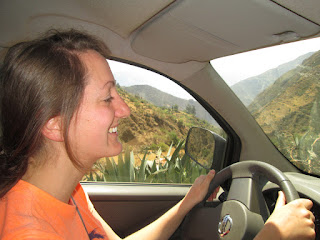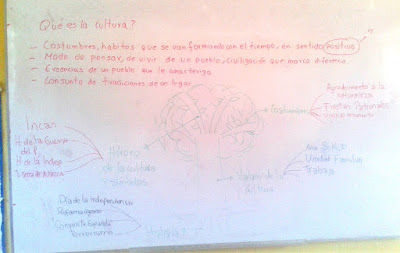I went on holiday to Tarapoto and Moyobamba - where I spent 2 months in 2003 for my university placement! Here I am with Liliana, another Civil Engineer, at the river we crossed many times to work in the villages on the other side.
Wednesday 30 November 2016
Thursday 17 November 2016
Ancobamba update
Training in Ancobamba has come up against several obstacles in the last few months.
First, I had to change the day of my visit. "That's fine" they said, "Come on Friday instead, no problem". On arrival we discovered the annual celebration of the patron saint was underway - with the whole village involved in special meals, dances, games, general fiesta-participation. Of course no-one came to the training.
The next week, we drove up to deliver some food boxes (these were donated to AIDIA for distribution to needy families). We unloaded, with some help from some friends, and were off back to Abancay almost immediately... but did have some time to confirm my next training session, and the dental visit that was coming up. I even got to drive home!
A few days later I was back, to give our postponed training session on water system maintenance. I had a good chat with the nurse at the health post, who helps me coordinate everything, and we were all set with everyone confirmed for the training.
Then it rained.
I mean a serious, blowing tiles off the roof, soaked within seconds, kind of storm. It's not surprising that nobody ventured out.
So no training.
With some persuasion (by the nurse, who is very proactive and helpful), people agreed to come early the following morning instead. After some waiting, there were eventually 3 of us. Not enough to give the training, but it was a worthwhile meeting where they settled on some other work that needed to be done.
2 weeks later, off I went again. Unfortunately, the bus broke down less than an hour out of Abancay. We waited about 4 hours for the replacement bus to come (it was a nice sunrise) and did get to Ancobamba in the end. But in the meantime, they had decided I wasn't coming, and the nurse had left to have an unplanned afternoon off.
So no training.
Finally, last week, we went again. The bus arrived on time, we had breakfast, had a nap (the bus leaves super-early so we arrive very tired), I did some teaching in the school about the water cycle... Then discovered that while I had been asleep, the water board had had a meeting, made lots of decisions (which is great), one of which was that they weren't going to meet again in the evening.
Again, no training.
But I did find a representative from a government subsidy programme who helpfully gave me a lift down the mountain on his motorbike. So I could get back to Abancay the same day.
It's pretty encouraging that the water board is now having meetings and making decisions. They seem to be a lot more proactive than they were when I started visiting. So that's been worthwhile. It's just a shame that I have made so many journeys in order to try out training materials, and most of my material has remained un-tried.
But in the meantime, we have still been working with the nursery and the school, running a kids club and helping with literacy, visiting families and holding church services. So the visits haven't been a dead loss. But my aim of compiling a set of tried and tested teaching plans is a bit behind schedule!
First, I had to change the day of my visit. "That's fine" they said, "Come on Friday instead, no problem". On arrival we discovered the annual celebration of the patron saint was underway - with the whole village involved in special meals, dances, games, general fiesta-participation. Of course no-one came to the training.
The next week, we drove up to deliver some food boxes (these were donated to AIDIA for distribution to needy families). We unloaded, with some help from some friends, and were off back to Abancay almost immediately... but did have some time to confirm my next training session, and the dental visit that was coming up. I even got to drive home!
The dental visit the following week was a big contrast from my first one nearly 2 years ago... now I know so many more people and was able to help things run smoothly, helping prepare the lunch, and keeping the young children (hopefully) cheerful while they had dental work done. There was no water-related training planned for this visit.
A few days later I was back, to give our postponed training session on water system maintenance. I had a good chat with the nurse at the health post, who helps me coordinate everything, and we were all set with everyone confirmed for the training.
Then it rained.
I mean a serious, blowing tiles off the roof, soaked within seconds, kind of storm. It's not surprising that nobody ventured out.
So no training.
 |
| The tiny patch of clear sky I could see from my shelter in the health post. |
2 weeks later, off I went again. Unfortunately, the bus broke down less than an hour out of Abancay. We waited about 4 hours for the replacement bus to come (it was a nice sunrise) and did get to Ancobamba in the end. But in the meantime, they had decided I wasn't coming, and the nurse had left to have an unplanned afternoon off.
So no training.
 |
| Luggage transfer from the new, broken down, bus, to the ancient-and-with-no-documentation-but-reliable bus. |
Again, no training.
But I did find a representative from a government subsidy programme who helpfully gave me a lift down the mountain on his motorbike. So I could get back to Abancay the same day.
It's pretty encouraging that the water board is now having meetings and making decisions. They seem to be a lot more proactive than they were when I started visiting. So that's been worthwhile. It's just a shame that I have made so many journeys in order to try out training materials, and most of my material has remained un-tried.
But in the meantime, we have still been working with the nursery and the school, running a kids club and helping with literacy, visiting families and holding church services. So the visits haven't been a dead loss. But my aim of compiling a set of tried and tested teaching plans is a bit behind schedule!
 |
| Dina teaching in the nursery |
 |
| New friends! |
Tuesday 15 November 2016
Filters in use!
Since the workshop we had in September to have a go installing the Sawyer filters, I've been thinking about how we can use them.
Now I've started a pilot project, getting 4 families from AIDIA to try using the filters in their homes. I've given them free rein to make modifications and set up the filter how best suits them - as long as they share their innovations with me! I'll visit once a month and get feedback about how it works in practice and any suggestions they make, as well as figuring out how often it needs cleaning.
Here are the first 2 filters with their owners.
I'm giving some training too. First up, some basic information about how the filter works. Here are my props: the 4 different types of pathogen found in water (helminth, protozoa, bacteria and virus), and how the filter removes them. Only viruses can make it through, which means some other treatment is still recommended.
We talked about how the filter should be cleaned... in later visits we'll look at ways to store the filtered water so that it doesn't get re-contaminated.
If the trial goes well, I'll hope to implement a village-wide project in one of the areas where we work - next year.
Now I've started a pilot project, getting 4 families from AIDIA to try using the filters in their homes. I've given them free rein to make modifications and set up the filter how best suits them - as long as they share their innovations with me! I'll visit once a month and get feedback about how it works in practice and any suggestions they make, as well as figuring out how often it needs cleaning.
Here are the first 2 filters with their owners.
I'm giving some training too. First up, some basic information about how the filter works. Here are my props: the 4 different types of pathogen found in water (helminth, protozoa, bacteria and virus), and how the filter removes them. Only viruses can make it through, which means some other treatment is still recommended.
If the trial goes well, I'll hope to implement a village-wide project in one of the areas where we work - next year.
Thursday 3 November 2016
Student weekend
Last year, I started helping the CBU - the Peruvian version of university Christian Unions - with some of their events and generally trying to encourage them, and help new students from Christian families in rural villages to get to know the church in Abancay.
Each year, the groups from the universities in the south of Peru get together for a conference. Last year, the Abancay CBU got really enthusiastic, and offered to host it in 2016.
So we've been doing lots of planning and preparations and fundraising activities, and the big weekend finally arrived.
We had students from Cusco, Puno, Arequipa and Tacna...
The theme of the weekend was "not because you must but because you are willing" based on 1 Peter 5:2.
I took along my piano and guitar and to start with was leading all the music... but over the next few days the students joined in and took over :)
I led a workshop about Cross-Cultural Mission. We talked about what culture is and then a bit about which of the ways our church does things come from culture and which come from the Bible. There were a few surprises, which showed us the importance of listening and learning well before trying to bring new ideas. We finished up considering the classic pattern of culture shock or culture stress, and how to be firmly anchored in God, to be able to consistently produce fruit (Psalm 1 and Jeremiah 17:7-8).
I spent quite a lot of the time helping prepare the food - it was quite fun, and turned out delicious.
It was a great time of teaching, fun, encouragement and comparing ideas for how the different CBUs can learn from and support each other.
With those who didn't have to leave early, we went down to the colonial bridge in the gorge and walked along to some hot pools right next to the river.
Each year, the groups from the universities in the south of Peru get together for a conference. Last year, the Abancay CBU got really enthusiastic, and offered to host it in 2016.
So we've been doing lots of planning and preparations and fundraising activities, and the big weekend finally arrived.
 |
| Making plans with the Abancay team |
I took along my piano and guitar and to start with was leading all the music... but over the next few days the students joined in and took over :)
I spent quite a lot of the time helping prepare the food - it was quite fun, and turned out delicious.
It was a great time of teaching, fun, encouragement and comparing ideas for how the different CBUs can learn from and support each other.
With those who didn't have to leave early, we went down to the colonial bridge in the gorge and walked along to some hot pools right next to the river.
Perhaps too many people for the 15-seater minibus? (In the end we took 2)
It was VERY windy!
Subscribe to:
Posts (Atom)



















